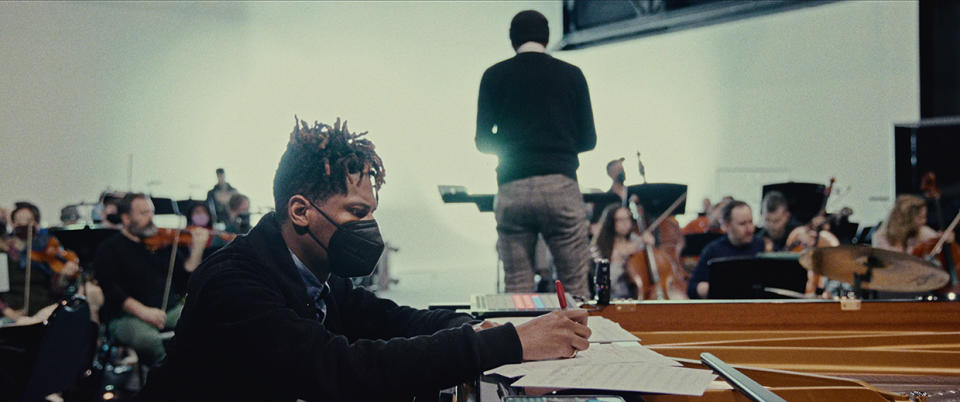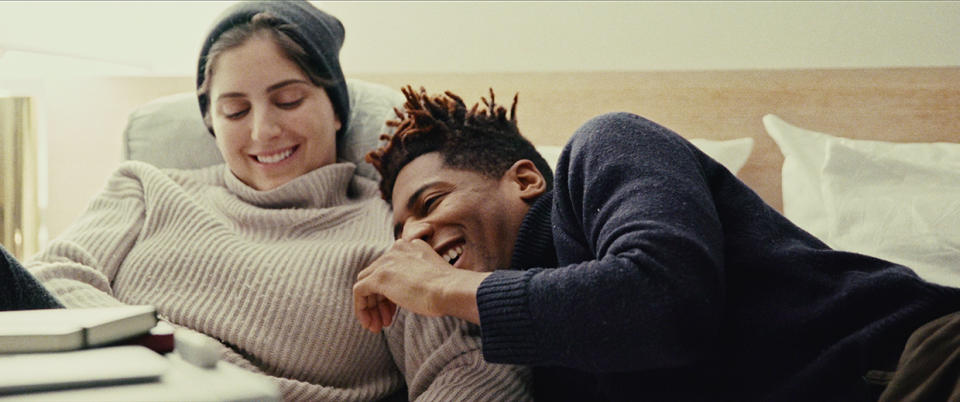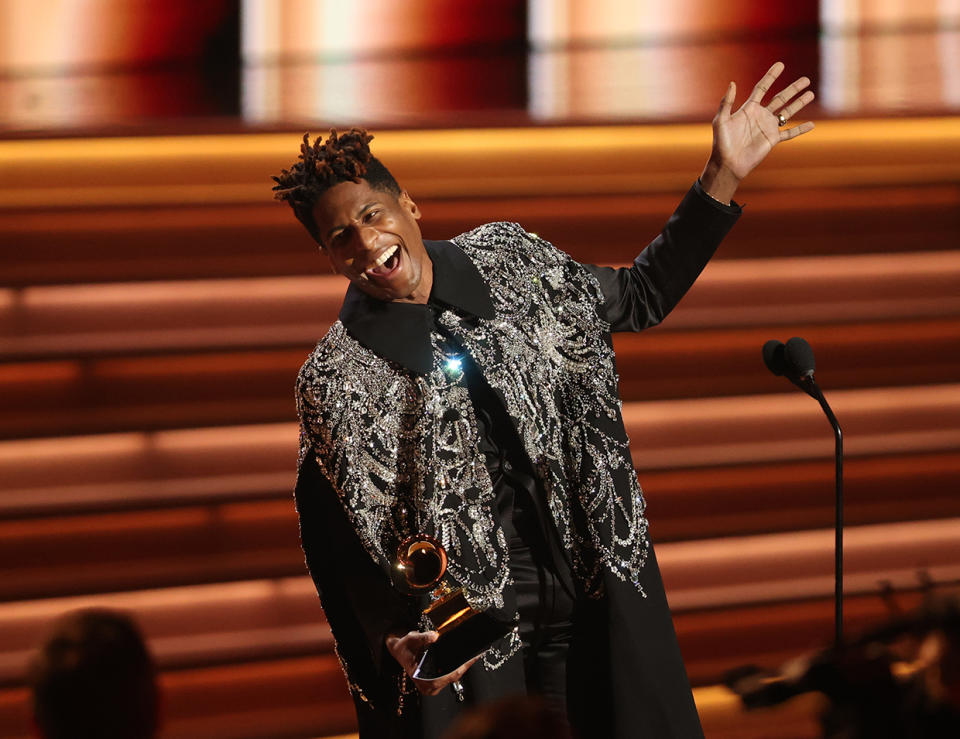Jon Batiste on Getting Vulnerable For New Netflix Documentary ‘American Symphony’
- Oops!Something went wrong.Please try again later.

One of the most multifaceted — and busy — artists working today, Jon Batiste sometimes seems like a superhuman — a seemingly inexhaustible bundle of exuberance, creativity and energy. The New Orleans-bred, Juilliard-trained pianist, singer, songwriter and composer, with his band Stay Human, spent seven years gaining a huge audience as bandleader on The Late Show With Stephen Colbert; he’s led “love riots” through the streets of New York, playing melodica literally among the city’s inhabitants; he’s won an Oscar and a Golden Globe as co-composer of the score for Pixar’s Soul; and he’s of course won Grammys, five last year alone, including album of the year for his We Are.
But as the moving new documentary American Symphony shows, Batiste, like so many artists, has a complex private life that his public rarely glimpses. Capturing an especially high-and-low-filled year in Batiste’s life, it interweaves Batiste’s experience as he composes the ambitious titular orchestral work for a Carnegie Hall debut, with the harrowing journey he and his partner, the author-artist Suleika Jaouad, find themselves on when, after a decade in remission, her cancer returns — all shortly before his astounding 11 Grammy nominations arrive.
More from Billboard
Taylor Swift Celebrating Birthday By Bringing Expanded Eras Tour Movie to On-Demand
Taylor Swift Poses Backstage With Family of Fan Who Died at Rio De Janeiro Show
Jennifer Lopez Announces 'This Is Me...Now' Release Date, Plus Details About First Single & Film
Directed by Academy Award-winning director Matthew Heineman — who followed Batiste and Jaouad for seven months, filming over 1,500 hours of footage — and coproduced by Barack and Michelle Obama’s Higher Ground Productions, American Symphony opens in select U.S. theaters today before arriving on Netflix Nov. 29 (the film features a poignant new song, “It Never Went Away,” which Batiste wrote with Grammy-winner Dan Wilson, out now on Verve Records/Interscope). On Feb. 4, he could potentially make another significant showing at the Grammys, where he has six nominations, before heading out on his Uneasy Tour: Purifying the Airwaves for the People Feb. 16, supporting his latest album World Music Radio.
In the days leading up to his film’s premiere, he spoke to Billboard about opening up his and Jaouad’s lives to Heineman’s cameras, the importance of artists’ mental health, and why at this point he has to “chuckle” at the Grammy chatter around him.
In the film, we see your composing process up close, and it looks much more collaborative than the usual symphony composer’s may be. Is that your typical process?
I’m always composing, and it’s not so different actually with a large-form but also longform piece. It was more about thinking about the form, from point A, B, C, D all the way to Z before starting, and then composing into a form that could shift and change depending on what discoveries I made along the way. When I’m writing songs or instrumental music or just a tune, it can happen in the moment, it doesn’t have to happen before I start. [For a symphony] there’s a lot more pre-planning, and then figuring out symbolically with American Symphony how I wanted to use the music as an allegory for certain values, the philosophy that was underpinning it.
If you think about the term classical music — which I love and has probably the biggest influence on my artistry, besides American music and jazz and New Orleans — every composer that comes from that tradition was drawing on the folk musics and traditions they grew up with, the country and time they lived in. The core quest with American Symphony was: if the symphony orchestra and symphonic compositions were to address America today, if they were invented today and I was the inventor, what would I be drawing from, what would I see in my culture and in the American landscape and the milieu I come from? That was really exciting.
Growing up in the generation where streaming music became the norm, electronic music and all the different technological advancements that we’ve come to now see as the norm — all these different approaches to collaboration and music in general that didn’t even exist back when Beethoven was making the seventh symphony or when Duke Ellington was around, but we can still use the lessons of those compositions. Duke, who’s one of my heroes, if he knew a certain musician in the orchestra had a specific approach to playing high notes, or playing ballads, or leading a section, he’d lean into that and compose toward that, and that’s something I always have a voice for. There’s so much you can speak to that many composers before me were speaking to, but I had a unique opportunity here to do a lot.
Creativity and creating art is clearly an important part of your relationship with Suleika, but at the premiere of American Symphony, it almost seems like a real surprise to her. When you’re at work on new music, do you play it for her?
She’ll hear pieces of things and I’ll play things for her typically in fragments, or in a state where the grandeur of what it will be isn’t obvious yet. As you saw in the film there’s a process of it coming to life that can only happen when I’m in the room with the other musicians. So it’s kind of hard to show that to Suleika in full before it happens, it just has to become what it is through a process of constant listening, refinement, composition. A piece like American Symphony is never meant to be completely finished, it’s meant to be a vehicle that evolves over many many years with different folks who can take ownership of all the themes of the piece, and the form and structure. Fifty years from now, if this is played in another part of the world by different musicians, it would be its own unique version.

We see a lot in the film how you have to constantly navigate between the public face you show the world and what you’re contending with privately, with Suleika’s illness. Especially when the public seems to expect you to be this joyful person at all times, that seems really challenging.
It’s really something that I’ve struggled with for awhile. And I value parts of it as well — the idea of being able to bring folks a sense of uplift-ment in dark times, as a performer, an entertainer, an artist is something I value. But in general it’s been a struggle to navigate the humanity of being all those things. A lot of times I think that’s the case, which is one of the reasons why such an invasive film like this, and the vulnerability required of our family to share what you see, is something we wanted to move forward with. Sometimes pulling the curtain back is an opportunity for us all to tap into our humanity and not only see me in a certain way and realize, “Wow, these are things we all go through.” We can all grow from seeing it and have a deepened respect for this person we admire.

You’re incredibly open in the film about therapy, and about the mental health aspect of being an artist on the level you are. What was behind your decision to be open about this?
I hope it’ll be a beacon for a lot of artists. I fear that when people are successful, especially in a public sense, it creates an illusion of ease. I don’t ever want to make anyone feel lesser, or any artist feel like because they’re struggling in this crazy business with their mental state and fortitude that they’re not just like everybody else. Especially folks who are successful, you never know what somebody has given up or decided to do to get to where they are. We’re all just human beings dealing with the same set of things. It’s better if we show it more, rather than hide it away in a curated social media presence.
Your stunning performance of “Freedom” at the 2022 Grammys is in the film — contextualized with a very clear picture of what you and Suleika were going through at the time, which makes seeing its exuberance especially astounding. Watching it now, what do you see?
It’s tough to watch the film. I don’t have a good barometer because I’ve only seen it a handful of times over the course of the edits. I do have a sense of what the film is like, and living through those moments, the Grammys performance was very much a lot of catharsis, and also a lot of vindication. Just being present in the moment was a difficult thing for me to do given where Suleika was and how much I wanted to be there with her, but also knowing how much she wanted me to be in the moment I was in. So the performance was a great way of zeroing into the moment and, as it always is for me, just channeling and trying to lift the present to a place of transcendence to what we do on the stage. And that moment in particular was more like that than winning the awards we won — it was just a real manifestation of what I do, and what all those artists in there, what I imagine drives them: the performance, not the awards.

We hear in voiceover some of the detractors who were rather loud in the wake of your big Grammy wins. How aware were you of that narrative in the moment, and how did you approach including it in the film, which I assume wasn’t easy?
I’m at a point, to be frank, that I don’t really care. These are things I’ve gotten used to in terms of creating music and doing things that are speaking to the culture, doing things that are counterculture, things that are perceived to be one way when they’re completely the opposite of that. I’ve been perceived to be an institutionalist, and to be not institutional enough. To be a person who is too sophisticated, and to be someone who is dumbing down what they do too much. To be a person who is a part of a fix in the system, someone who comes out of nowhere, and also as the industry darling or the vet or the favored one, who’s constantly had privileges. What that tells me overall, since I’ve been doing this from the age of 15 in New Orleans, is just that I have longevity and I have impact.
Even the fact of the symphony upon its performance at Carnegie Hall — which I unabashedly will say was a cultural moment, if not just for New York then for our country, for music — for there to be no critical review or discussion that was remotely intelligent discourse, with so many firsts [achieved with it that] I’ve lost count? I’m just so used to it. Twenty years in, you just kind of chuckle about it. Eventually, maybe, people will catch on, but I don’t really do it for that. Ultimately it’s just a matter of doing what I’m doing and doing what I love.
Best of Billboard
H.E.R. & Chris Brown 'Come Through' to No. 1 on Adult R&B Airplay Chart
Anne Wilson's 'I Still Believe in Christmas' Crowns Christian Airplay Chart
